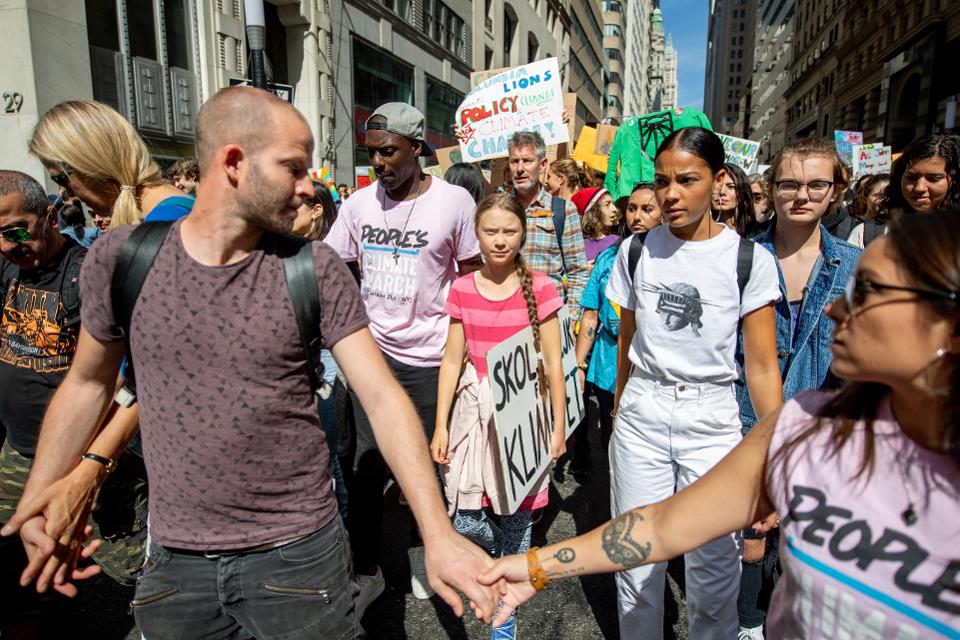About 9 years ago, in a classroom in Stockholm, a quiet schoolgirl was taught about climate change. She and her classmates were encouraged to recycle, and switch lights off, and the curriculum moved on.
Disoriented, she did not move on. If what had been said was true, why wasn’t anyone doing anything? Why did people around her act as though there were no crisis if, in fact, they all knew there was one? “To me, that did not add up. It was too unreal.”
Deeply confused by what she was hearing Greta Thunberg started reading about climate change.
About 7 years ago, Greta fell into a deep depression. Convinced by the strong scientific consensus on the climate crisis, she could see little hope for the future. Her parents took time off work to be together and get her help. Eventually she was diagnosed with Asperger syndrome, OCD and selective mutism.
Greta, meanwhile, began campaigning her parents to give up flying, eating meat, and dairy. When facts and figures didn’t work, she took a more emotive approach. In her own words, she made them feel “so so guilty” for what she saw as their hypocrisy, and for stealing her future. After about two years, her parents gave in, her mother giving up an international opera career. According to her dad, they were more motivated by saving their daughter and family than saving the climate.
Less than two years ago, in May of 2018, Greta won a climate change essay competition in a Swedish newspaper. A youth climate change organisation got in touch with her following its publication, and one of them came up with the idea, inspired by the Parkland students, to ‘strike for the climate.’
A year and five months ago, re-energised by success at home and inspired by the idea Greta decided to strike from school for three weeks in protest against the adults “shitting on my future.” As she couldn’t convince anyone to join her, she started alone.
A day later, she was no longer alone.
A week later, international media was reporting on her strike.
A month later, she was joining demonstrations throughout Europe and making high profile speeches.
Two months later, she gave a TedX talk in Stockholm.
Three months later, strikes had been held in at least 270 cities, and Greta addressed the COP24 United Nations climate change summit.
And so it has continued from there. The, rest, as they say, is history (in the making).
Greta has just a handful of key messages:
This is a crisis: “I want you to act as if the house was on fire, because it is.”
Science and facts should take precedence over self-interest: “You only speak of green eternal economic growth because you are too scared of being unpopular…You are not mature enough to tell it like it is.”
Adults should be deeply ashamed of the mess they have made for the next generation: “This is all wrong. I shouldn’t be up here. I should be back in school on the other side of the ocean. Yet you all come to us young people for hope? How dare you?”
To say she has been influential is an understatement. If a prophet is someone who speaks truth – and often uncomfortable truth – as a wake-up call to a lost people, then Greta is surely a prophet for our times. And yet, as she sees it, until concrete action is put in place to avert disaster, “We have achieved nothing.”
Like many prophets before her, Greta is a reluctant spokesperson. She dislikes being the centre of attention and believes that others should be taking this responsibility so that children can safely go back to school. She is also seen as a sufficiently influential wake-up call from denial, that multiple world leaders have mocked and attacked her.
But, tired of empty “hope” she continues to take action, saying “When we start to act hope is everywhere. So instead of looking for hope – look for action. Then the hope will come.”
Questions
Have you ever won a competition?
How different was your life a year or two ago than it is today?
Do you agree with Greta that “one thing we need more than hope is action”?
Long before Greta was a global activist she was learning, getting demoralised, struggling with mental health and loneliness, campaigning to persuade those closest to her to change their behaviour, entering a competition, connecting with others, trying (and failing) to convince others to join her in a bold idea, and finally going it alone despite nearly unanimous disapproval, including from her parents. Do any of these parts of her story surprise you?
Do any them represent particular ‘hurdles’ for you in your own life?
Last week we talked about an issue you want to understand better in order to do something about it. What’s your next step?
What is holding you back from that?
Photo from here no copyright restrictions stated.
This post is written by one of our many friends. At BeachcomberFX we love to hear what others have to say and are always on the lookout for people who want to share their thoughts or stories with us.
